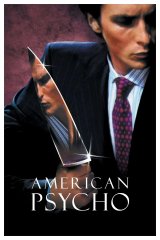
American Psycho Page #15
- Year:
- 2000
- 3,968 Views
VAN PATTEN:
Whose moronic idea was it to drink dry beers? I need a Scotch.
The sounds of the bar fade down. The following voiceover runs over images of Bateman and his friends ordering drinks, talking on portable phones, talking, laughing - combined with images of other very similar young men at other tables drinking, talking on portable phones, talking, laughing,
BATEMAN (V.O.):
There are no more barriers to cross. All I have in common with the uncontrollable and the insane, the vicious and the evil, all the mayhem I have caused and my utter indifference toward it, I have now surpassed...My pain is constant and sharp and I do not hope for a better world for anyone. In fact I want my pain to be inflicted on others. I want no one to escape.
INT. HARRY'S BAR - EARLY EVENING
As the film ends the camera moves CLOSE on Bateman. He is leaning back in his leather armchair, drinking a double Scotch, his eyes blank.
BATEMAN (V.O.):
But even after admitting this, there is no catharsis. My punishment continues to allude me. I gain no deeper knowledge about myself, no new knowledge can be extracted from my telling. This confession has meant nothing...
Translation
Translate and read this script in other languages:
Select another language:
- - Select -
- 简体中文 (Chinese - Simplified)
- 繁體中文 (Chinese - Traditional)
- Español (Spanish)
- Esperanto (Esperanto)
- 日本語 (Japanese)
- Português (Portuguese)
- Deutsch (German)
- العربية (Arabic)
- Français (French)
- Русский (Russian)
- ಕನ್ನಡ (Kannada)
- 한국어 (Korean)
- עברית (Hebrew)
- Gaeilge (Irish)
- Українська (Ukrainian)
- اردو (Urdu)
- Magyar (Hungarian)
- मानक हिन्दी (Hindi)
- Indonesia (Indonesian)
- Italiano (Italian)
- தமிழ் (Tamil)
- Türkçe (Turkish)
- తెలుగు (Telugu)
- ภาษาไทย (Thai)
- Tiếng Việt (Vietnamese)
- Čeština (Czech)
- Polski (Polish)
- Bahasa Indonesia (Indonesian)
- Românește (Romanian)
- Nederlands (Dutch)
- Ελληνικά (Greek)
- Latinum (Latin)
- Svenska (Swedish)
- Dansk (Danish)
- Suomi (Finnish)
- فارسی (Persian)
- ייִדיש (Yiddish)
- հայերեն (Armenian)
- Norsk (Norwegian)
- English (English)
Citation
Use the citation below to add this screenplay to your bibliography:
Style:MLAChicagoAPA
"American Psycho" Scripts.com. STANDS4 LLC, 2024. Web. 26 Dec. 2024. <https://www.scripts.com/script/american_psycho_27063>.


Discuss this script with the community:
Report Comment
We're doing our best to make sure our content is useful, accurate and safe.
If by any chance you spot an inappropriate comment while navigating through our website please use this form to let us know, and we'll take care of it shortly.
Attachment
You need to be logged in to favorite.
Log In